Feed aggregator
SHROUD by Adrian Tchaikovsky
DOGE- Supernatural Division (episode 5)
Cover Reveal: Space Ships! Ray Guns! Martian Octopods!: Interviews with Science Fiction Legends, edited by Richard Wolinsky
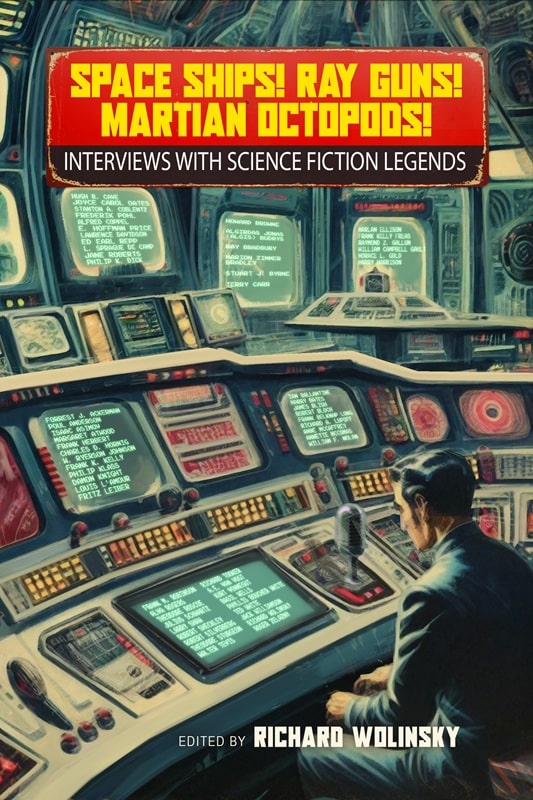 Space Ships! Ray Guns! Martian Octopods!: Interviews with Science Fiction Legends (Tachyon Publications, September 2, 2025). Cover by Yoshi Vu
Space Ships! Ray Guns! Martian Octopods!: Interviews with Science Fiction Legends (Tachyon Publications, September 2, 2025). Cover by Yoshi Vu
At Black Gate, we’re all about science fiction legends. Specifically, science fiction legends who appeared in paperback in spinner racks in the 70s and 80s. Or pulp magazines. Or wrote adventures at the dawn of the role playing industry. You know what, forget all that. We’re not picky.
What makes a true science fiction legend? This is the sort of thing that’s hotly debated on social media, and at science fiction conventions, and in lengthy blog posts titled “Towards a New Science Fiction Canon, Because Yours is Old and Stupid.” But recently, public opinion has shifted. To be a science fiction legend, the most important criteria is that your name looks good in green font on a 50s CRT monitor, preferably in a cool underground bunker. Exactly like the cover of Space Ships! Ray Guns! Martian Octopods!: Interviews with Science Fiction Legends, the upcoming book from Richard Wolinsky and Tachyon Publications.
I’ve spent long hours staring at this cover (by the marvelously talented Yoshi Vu), and the more I do, the more I’m convinced I’m right. Just look at those names. Look at how cool they are! Roger Zelazny, Theodore Sturgeon, Robert Sheckley, Jack Williamson, Fritz Leiber, Damon Knight, Poul Anderson, Isaac Asimov, Anne McCaffrey, William F. Nolan, Terry Carr, Frederik Pohl. Right now you’re shaking your head, but you know I’m right.
Those glowing green names don’t just constitute a comprehensive list of true science legends. Coincidentally, they also happen to be included in this fabulous book of interviews. Don’t take my word for it; here’s the press release to show how right I am.
In this collection of candid interviews, more than fifty legendary authors swap fascinating — and sometimes controversial — anecdotes about the Golden Age of science Fiction (1920–1960). With such guests as Ray Bradbury, Robert Bloch, Harlan Ellison, Philip K. Dick, Isaac Asimov, Margaret Atwood, Fritz Leiber, Frank Herbert, and many more, here are the wild personalities, sparks of contention, and vivid imaginations that made science fiction thrive.
Today, depictions of aliens, rocket ships, and awe-inspiring, futuristic space operas are everywhere. Why is there so much science fiction, and where did it come from? Radio producer and author Richard Wolinsky (Probabilites) has found answers in the Golden Age of science fiction.
Wolinsky has interviewed a veritable who’s who of famous (and infamous) science fiction publishers, pulp magazines, editors, cover artists, and fans. The interviews themselves, which aired on the public radio show, Probabilities, span more than twenty years, from just before the release of Star Wars through the dawn of Y2K. The result, Space Ships! Ray Guns! Martian Octopods!, is ultimately a love letter to fandom.
See? I told you.
I’m not familiar with Richard Wolinsky, but it’s clear that I should be. He cohosted Probabilities, a half-hour public radio program devoted to science fiction, mystery, and mainstream fiction, which aired in San Francisco for nearly twenty years, from 1977 – 1995. After he took the program solo in 2002 he renamed it Bookwaves, and that incarnation is still running.
Space Ships! Ray Guns! Martian Octopods!: Interviews with Science Fiction Legends belongs on every serious science fiction bookshelf. It definitely belongs on mine, anyway.
It will be released from Tachyon Publications on September 2, 2025. It is 256 pages, priced at $18.95 in paperback and $11.00 in digital formats. Get more details and order copies directly from the publisher here.
Oh Crap It's February
Here's an example of a stick that's been beating our entire family:
My 24-year-old cousin was diagnosed a few weeks ago with what ended up being Stage 4 ovarian cancer. She's struggling to survive as we speak. I know that's a very serious shift in tone for this blog, but it is true, and things are still very difficult for her and her immediate family right now.
That alone is enough to make it a long year already.
But on a lighter note, I am making progress on writing! Book 4 of The Last Horizon proceeds on schedule, and an early draft has even gone out to some of the beta readers.
I also almost forgot to blog this month because time passes so quickly. And because I forgot this month only has 28 days. As the rhyme goes, "30 days hath September, plus the ones I don't remember. All the rest have 31, but when you know the month is done, February steals the sun. March and April steal it back, then May stabs April in the back. For August, that ungrateful hack."
-Will
Oh no, not the Hughday?
There might not be a Hughday next week. We have to push through on the editing. But meanwhile we offer extra today.
 Totally not my chicken. Stock Image.
Totally not my chicken. Stock Image.
Bucky clopped down the road, stamping his hooves into the old asphalt with cheerful abandon. The day was bright and lovely. A clear blue sky, flooded with crystalline sunshine and feathered with white clouds, stretched overhead. The magic hit about ten minutes before they left the castle, and Bucky’s coat glowed an ethereal white.
Hugh watched the autumn woods pass by them, awash with yellow, gold, and scarlet. Behind him, Bale rode on a chestnut Morgan mare, and behind the berserker, the delegation from Aberdine chugged along on their horses, grim-faced and looking like someone pissed in their cornflakes. Five Iron Dogs brought up the rear.
Bishop nudged his gelding and caught up, drawing even with Bucky.
Hugh waited.
Bishop cleared his throat.
“Something on your mind?”
“I know your people are good.”
“They are.”
“I mean no disrespect, but there are at least seventy mercs camped out in our field.”
“You mentioned that.”
Bishop glanced behind them.
“You’re bringing six soldiers.”
Hugh pretended to frown. “You think it’s overkill?”
“You know what I mean. They’ve got this guy, Silas. He’s as good as any of yours.”
Silas, huh? “Did Silas do that?” Hugh nodded at Bishop’s arm.
The lawman grimaced. “No. That was Falcon’s personal goons. He’s got these three guys that follow him everywhere. Not especially good, but big and happy to hurt people. You can always tell the types who are in it for a chance to dish out some pain. They get off on it.”
“Good to know.”
They rode for a bit more.
“We could turn around and get more people,” Bishop said.
“No need.”
“I don’t want any of you getting hurt for nothing.”
“Ah, that’s sweet. I didn’t know you cared.”
Bishop heaved a sigh and dropped back.
Bale chuckled softly.
“You watch yourself,” Hugh told him.
“Poor fella is worried about our safety.”
“He is the chief of police. He gets paid to worry about things like that. Besides, you heard what he said. They have Silas.”
“I heard that.” Bale’s eyes lit up. “As good as one of ours.”
“We’ll have to test that.”
The trees parted, and the road unrolled into the open, with Aberdine rising in the distance. Before the Shift, it was a typical small Southern town, with a handful of street lights and gas stations, a Wells Fargo, a firehouse, a school, and too many Dollar Generals. Now a sturdy wooden palisade, reinforced with steel beams, guarded the few blocks inside the city’s center, with scattered homesteads and farms crowding around it.
Like most modern settlements, Aberdine kept a cleared kill zone between the town and the few surrounding farms and the forest. Coller Road, on which they now rode, cut right through that cleared land, leading to the city gate. The gate was shut. Old tents were pitched on both sides of the road, some military issue, others the civilian camping type. People mulled about, dressed in random gear, unshaven, looking hungry.
Hugh scanned the camp. Sloppy. No guards or sentries posted. No signs for designated latrines, no cook tent, no mess hall. No cleared spots for drills and training.
The wind brought a whiff of shit and other human body odors.
Lovely.
The mercenaries glared at them as they rode past.
“Ooh, so much hostility,” Bale said. “I’m beginning to feel unwelcome.”
The bell on Aberdine’s fire tower pealed, ringing out three times.
Hugh looked at Bishop over his shoulder.
“I didn’t tell them to do that.”
So much for the element of surprise.
A group of men moved in front of the gates, blocking the road. The one in front was tall and beefy, with reddish hair cut regulation short, so close cropped on the temples, he looked like he had a short mohawk. Heavy jaw, almost no neck, small cold eyes. The man stared at them like a gator watching a deer sneak in for a drink in his lake.
The five mercs around him didn’t seem any friendlier. They were cleaner than the rest, better fed, better equipped, with some remnants of military bearing, but there was no doubt of it. This wasn’t an organized, disciplined unit with hierarchy and defined roles. This crew was run like a gang, with the clique at the top making all of the decisions. The best possible scenario.
Lamar had been right once again.
They were about twenty yards away from the mohawk and his entourage. Hugh stopped. Everyone behind him halted as well.
“You must be the man in the castle,” the mohawk said.
“You must be Falcon,” Hugh said.
Around them the mercenaries drew closer.
“I am,” the leader said. “Now that we know who’s who, what are you doing in my town?”
#
Elara layered mushrooms and chopped parsnips in the bottom of the Dutch oven. She tossed a few sprigs of rosemary, fresh sage, and thyme on top of that, and reached for the garlic cloves. One, two, six, eight…
“Don’t you think that’s enough garlic?” Savanah said.
“No.”
Ten, fourteen. That should do it. She poured about a cup of white wine into the pot, picked up the chicken, and set it on top of the vegetables. She’d already seasoned it with salt, pepper, and smoked paprika.
The older witch shook her head. Her dark curly hair was wrapped into a tight bun today. She’d recently bought a new pair of glasses with bright red frames that complemented her warm brown skin, and her hair clip matched the scarlet shade exactly.
“Why do you even bother?”
Elara washed her hands and dried them on a blue kitchen towel. “He’s my husband and he asked for something delicious for dinner.”
Savannah rolled her eyes. “We have a fully staffed kitchen.”
“He didn’t ask them. He asked me.” Elara put the lid on, opened the oven, and heaved the heavy cast iron pot into it.
“You could have made something easy. Why this?”
“Because he’s French and Chicken en Cocotte is the only French main dish I know how to make.”
“What is happening to you?” Savannah demanded.
Elara leaned back. “It’s a bargain. I make this and he comes back safe.”
“Who are you bargaining with?”
Elara waved the kitchen towel around. “Fate, the Source of All Life, everything. Whoever is around.”
Savannah threw her hands up. “What about the budget projections?”
“I have them right here.” Elara pointed to a stack of paper on the table.
“In the kitchen?”
“The budget projections don’t care where I read them. I have fifty minutes until I need to take the lid off and turn the fire up. Plenty of time. Just let me get the potatoes cut up.”
Savannah gave her a resigned sigh. “I’ll brew us some tea.”
#
“It’s not your town,” Bishop said.
Falcon squinted at him. “I thought we had an understanding. Instead, you went behind my back. And this was all you could get? Seven men?”
“Hope it was worth it,” a large dark-haired man offered on Falcon’s left.
Falcon glared at him and turned back to Bishop. “You and I are going to have a long talk after I deal with this. It seems to me you still don’t understand the chain of command.”
“I’ll make this short,” Hugh said. “My wife is cooking a delicious dinner, and I don’t want to be late. Aberdine doesn’t want you here. You have an hour to clear out.”
Falcon smiled. Behind him a couple of his heavies chuckled. “Is that so?”
“It is.”
Falcon squinted at him. “The folks in town tell me you’re some kind of a big deal. Well, that doesn’t mean shit to me.”
Why was it always the hard way?
Hugh let out a bored sigh. “We can kill the lot of you, but it would take a while and I’m getting hungry. Why don’t you pick your best guy, and I’ll pick one of mine. Sound fair?”
The mercenary leader gave him a calculated look, surveyed Bale and the five Iron Dogs behind him, then glanced at the tents. Falcon was not a complete fool, or he wouldn’t be able to hold this lot together. Bishop had left to get help, and now seven soldiers rode straight into Falcon’s camp. The numbers were clearly on his side, yet this new group was unbothered and their leader was now giving him orders.
Hugh could practically feel the wheels turning in Falcon’s head. The merc leader was thinking that the magic was up, so it was likely a factor. He had to suspect that they had an ace up their sleeve, and Hugh had just handed him a chance to see what it was. In Falcon’s mind, they could see what they were up against and even if they lost, they could always swarm them after. They had ten times as many warm bodies.
“Cherry, go get Silas,” Falcon ordered.
The dark-haired man who ran his mouth earlier took off and disappeared between the tents.
A minute passed. Another.
Cherry double timed back, slightly out of breath. A blond man followed him, carrying a katana in the traditional saya scabbard. He wore a black turtleneck, loose-fitting athletic pants, and dark tennis shoes. His hair was cut short, his jaw was clean shaven. He glanced at Hugh, his expression flat, and stopped in front of Falcon.
“Here he is,” Cherry announced.
“They want to put one of theirs against one of ours,” Falcon said. “I need you to explain to them why that was a bad idea.”
Silas turned and took five steps forward. He stood about five ten, with the kind of build that came from living by the sword – lean, spare, but strong, as if he was twisted together from steel cables.
Bale got down from his horse and made a show of loosening up his shoulders and back. “So, you’re their secret weapon?”
Silas didn’t answer. His gaze was fixed on Hugh as if Bale didn’t even exist.
Bale lumbered closer and scrutinized the swordsman. “What is this shit you’re wearing? Must be very high speed.”
The look on Silas’ face turned slightly desperate.
Falcon grinned in anticipation. The man was clearly loving this.
“Get them, Silas,” Cherry called out.
Silas held still.
“Have you got anyone else?” Bale leaned to the side to look past Silas at Falcon and his mercenaries. “This one looks a bit beaten down and half starved.”
“Silas!” Falcon snapped.
Silas didn’t move. He seemed in pain.
“What are you waiting for?” Falcon snapped.
Enough was enough. It was time to put Silas out of his misery.
“I’m waiting for you to put one of your men up for the fight,” Hugh said.
“Are you stupid?” one of Falcon’s men demanded.
“My man is standing in front of you,” Falcon said.
“No,” Hugh said. “These are both my men.”
Something broke in Silas’ expression, as if a wall inside him came crashing down.
The mercenaries stared at them.
“Dog!” Hugh called out.
Silas snapped to attention. “Yes, Preceptor!”
“Kill the next man who steps forward.”
“Yes, Preceptor!”
Silas pivoted around, faced Falcon, and unsheathed his sword.
Bale draped his arm around Silas’ shoulders. “You remembered how. See, I knew it would come back to you.”
“What the fuck is going on?” Falcon roared.
Hugh put some steel into his voice. “Put a soldier up or concede.”
Falcon stared at Silas. “Have you lost your fucking mind? What do you think is going to happen to your wife after we kill these assholes? Do the fucking math –”
Bale charged forward, mace in hand, the muscles on his right arm boiling and ballooning into a massive limb. None of the mercs had time to react. The berserker swung, monstrous muscle flexing. The mace whistled through the air and smashed into Falcon’s face. The mercenary leader’s skull cracked like an egg under a hammer. Chunks of brain and bone exploded, splattering onto the other men.
Bale twisted. Flesh rippled across his frame. His voice was a low inhuman growl.
“Who else wants to threaten my sworn brother’s family?”
He pointed the mace at the largest merc. “Is it you?” The mace moved to Cherry. “You?”
They backed away from him.
On the left, one of the mercenaries in the field by the tents raised a crossbow. On the right a mage was chanting, building up power and winding it into a bow like cotton candy on a stick.
Hugh pulled the magic to him and opened his mouth. “Osanda sapawur daas kair.”
Kneel before me and be silent.
The power words tore out of him, shaping the very matrix of magic. Power pulsed from Hugh, exploding in all directions like a blast wave from a bomb.
Seventy pairs of knees hit the dirt. The entire camp knelt as one. Only Bale, Silas, and the riders stayed where they were.
The mercenaries’ faces contorted. They were trying to rise, trying to scream, and couldn’t do either.
Silence claimed the field. You could hear a proverbial pin drop. Above them a hawk swooped, crying out.
This was the ancient power he had inherited from the Builder of Towers. He shouldn’t have been able to use it. Roland had purged him, ripping that gift away from Hugh, and yet there it was.
He’d been practicing for the last month, and the magic was getting easier. Every time he used a power word, it hurt less. He’d timed this one for about 10 seconds, because he wanted helplessness to sink in until it birthed terror. To the mercenaries kneeling on the field, every moment would stretch into eternity. They were panicking now. He saw it in their glassy eyes.
“One hour,” Hugh ordered. “Get your shit and be gone.”
The magic ran its course. The spell collapsed and the entire camp fell to the ground.
Bale hefted the mace onto his shoulder. “Silas, we looked for you everywhere. Look at you! You got married and none of us were invited. Introduce me to your wife, you bloody ass. I can’t wait to meet her.”
Silas turned to Hugh, his eyes still haunted and desperate.
“Preceptor, there is something wrong with my wife.”
Of course, it couldn’t be that easy. Hugh swung out of the saddle. “Lead the way.”
Elara’s Chicken en Cocotte with Roasted Young PotatoesModified from Christopher Kimball’s Milk Street recipe. The original is behind a paywall, but I highly recommend the subscription.
Chicken
- 1 3-4 pounds whole chicken
- 10-12 garlic cloves
- 3-4 parsnips, peeled and cut into large chunks
- 1 lb brown mushrooms, sliced into large chunks or whole if they are small
- 3 thyme sprigs
- 1 sprig sage
- 1 cup white wine (I used 2021 High Planes Rose from Lewis Wines)
- 1 small bunch of parsley
- butter, salt, pepper and smoked paprika
Roasted potatoes
- 1 5lb bag of young gold potatoes
- 1/4 cup of animal lard (if you are not BFFs with Grace Draven who sent me Wagyu beef lard, any lard will do. Duck fat would be great. You can do butter. You can also go with the olive oil for a healthier spin. But Wagyu lard was to die for.)
- A dash of Italian seasoning
- salt, pepper
You need a large Dutch over for this.
- Heat the over to 350 degrees with the rack in the center. Season the chicken with salt, pepper, and smoked paprika.
- Throw mushrooms and parsnips into the Dutch oven, arranging them in a single layer if possible. Scatter whole garlic cloves and sprigs of herbs on top of the vegetables.
- Pour 1 cup wine and 1 cup water over the vegetables. Place the chicken on top of the vegetable layer and put the lid on. Bake at 350 for 50 minutes.
- Remove the pot from the oven. Melt some butter and brush it over the chicken. I ended up using around 1/4 cup of so. Return the chicken, uncovered, to the oven and turn it up to 450. Cook, uncovered, for 30 minutes or until the temperature of the thighs or breast reaches 175. The chicken will brown and develop a nice crust.
- Remove the pot from the oven. Using tongs, place the chicken into a deep platter or baking dish, tent with foil. (The original recipe used leeks and returned the Dutch oven to the over for another 10 minutes. I hate leeks, so my vegetables were perfectly cooked.) Discard herbs and half of the garlic. Remove vegetables to a serving platter. Mash the remaining garlic into paste in the Dutch oven.
- Turn off the oven – super important step I sometimes forget.
- After the chicken rested for about 10 minutes or so, remove it onto the cutting board. Pour the drippings from the platter into the Dutch oven. Set the Dutch oven on the stove and bring to boil, whisking the sauce. (Because I am a savage and I know my family’s tastes, I whisked about 1/3 packet of powdered turkey gravy into the sauce, but you can skip this step.) Cook until thickened. Mix in finely chopped parsley.
- Carve the chicken to your preference and arrange it on the platter on top of potatoes and vegetables. Or serve everything separately. (I served separately.) Pour the sauce over the chicken – it will be divine – and definitely serve it at the table.
Potatoes
- While the chicken is baking for that initial 50 minutes, wash the potatoes and slice them in half. Place the potatoes into a bowl, season with salt, pepper, and a dash of Italian seasoning, mix well, add you choice of melted fat or olive oil, mix again. dump the potatoes onto a baking sheet lined with parchment paper for the ease of cleaning. Arrange them cut side down. You wouldn’t think they would brown with paper, but they do.
- When you remove the chicken from the oven for the first time and turn the heat up to 450, pop the potatoes on the bottom rack. They will need roughly 40 minutes to bake, but you might want to check them at 30, depending on how small your potatoes are. The cut side should be crispy and the top side should be soft.
Grace Draven made her chicken with leeks, so if you want to ask her about it, here is her website and Facebook.
The post Oh no, not the Hughday? first appeared on ILONA ANDREWS.
Comment on End of Winter Update by Brian
In reply to Celia.
We give them swords and let them fight to the death?
The Enchanted Greenhouse - Early Book Review
 The Enchanted Greenhouseby Sarah Beth Durst
The Enchanted Greenhouseby Sarah Beth DurstWhat is it about:New York Times bestselling author Sarah Beth Durst invites you to her new standalone novel nestled on a far-away island brimming with singing flowers, honey cakes, and honeyed love. The hardcover edition features beautiful sprayed edges.
Terlu Perna broke the law because she was lonely. She cast a spell and created a magically sentient spider plant. As punishment, she was turned into a wooden statue and tucked away into an alcove in the North Reading Room of the Great Library of Alyssium.
This should have been the end of her story . . . Yet one day, Terlu wakes in the cold of winter on a nearly-deserted island full of hundreds of magical greenhouses. She’s starving and freezing, and the only other human on the island is a grumpy gardener. To her surprise, he offers Terlu a place to sleep, clean clothes, and freshly baked honey cakes—at least until she’s ready to sail home.
But Terlu can’t return home and doesn’t want to—the greenhouses are a dream come true, each more wondrous than the next. When she learns that the magic that sustains them is failing—causing the death of everything within them—Terlu knows she must help. Even if that means breaking the law again.
This time, though, she isn’t alone. Assisted by the gardener and a sentient rose, Terlu must unravel the secrets of a long-dead sorcerer if she wants to save the island—and have a fresh chance at happiness and love.
Funny, kind, and forgiving, The Enchanted Greenhouse is a story about giving second chances—to others and to yourself.
What did I think of it:*I was lucky enough to get a digital Advance Reader Copy of this book*
This is a standalone set in the same world as The Spellshop, but anyone who read and loved The Spellshop will recognize who Terlu is, and so needs to read this! New to this world? You can totally read and love this book without reading the Spellshop first, but believe me: you need both these books, they're both awesome!
I liked Terlu, and had a lot of sympathy for her, but then the grumpy gardener Yarrow was introduced, and just Wow! He and I have a lot in common I have to confess. From that point on I so rooted for the both of them,(maybe a little bit more for Yarrow) that they would succeed in saving the greenhouses.
I feared one of my least favorite tropes would happen in this book, and it did, but Durst managed to write it in a way that didn't make me want to puke like I usually do with this particular trope (which I will name the 'Shiny Happy People' trope to not spoil too much).
So with a certain trope handled in the best was possible this was just as beautiful and emotional a read as The Spellshop. I loved reading about the wonders in the greenhouses, and learn more about the world Durst created. There's tons of beauty and whimsy, next to a really emotional story that also has lots to smile about.
You bet I will impatiently wait for the release and get my trotters on the hardcover to place it next to The Spellshop. And if there's to be more books: I'm going to hope it will be about certain characters who have a small role in this book.
Why should you read it:It's a great, cozy Fantasy with a wonderfully grumpy gardener.
Expected publication: July 15, 2025 by Bramble
Goth Chick News: Time Stands Still in Pause: John Carpenter’s Latest Sci-Fi Horror Comic
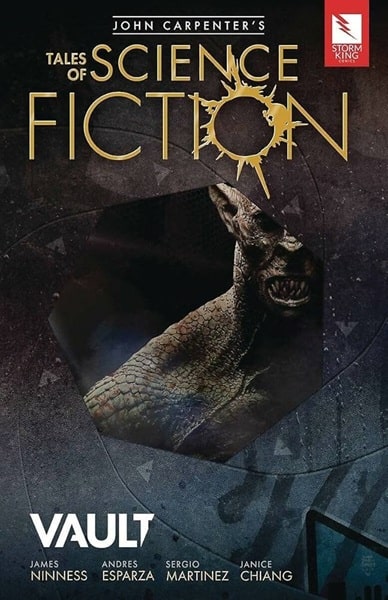
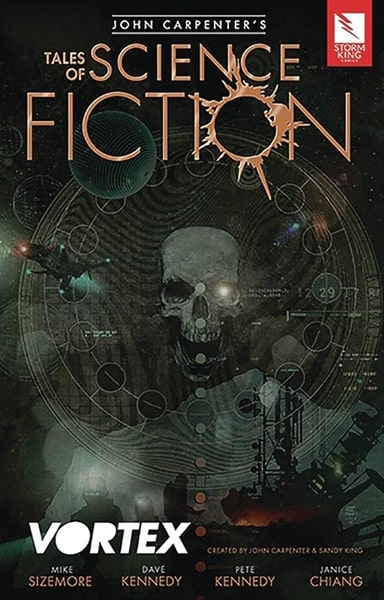
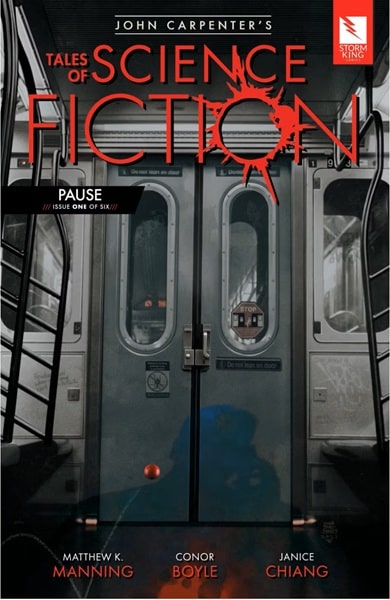
John Carpenter’s Tales of Science Fiction: Vault (June 2018), Vortex
(October 2018), and issue #1 of Pause (February 26, 2025
Storm King Comics was founded in 2012 by legendary filmmaker John Carpenter and his wife of thirty-five years, producer Sandy King. Together, they are known for delivering stories of horror, science fiction, and the supernatural, with series like John Carpenter’s Tales of Science Fiction and John Carpenter’s Tales for a HalloweeNight. Combining Carpenter’s cinematic style with the visual storytelling of comics, Storm King Comics offers fans immersive experiences that have cemented its reputation in the comic book industry.
I was first introduced to Storm King Comics by the grand dame herself, Sandy King, when I met her in 2016 at C2E2. Since then, I have collected all the issues from Tales for a HalloweeNight as well as Asylum which was my first exposure to the great stories that come out of Storm King. And though I am not a sci-fi girl strictly speaking, I love a good crossover, which this week’s launch seems to be.
For a bit of background, John Carpenter’s Tales of Science Fiction launched in 2018 with its inaugural story Vault, telling the tale of a moon-bound crew who discover an alien vessel with English markings. Since that time there have been eleven total installments and this week the series returns with installment twelve, entitled Pause.
Here’s what you have to look forward to…
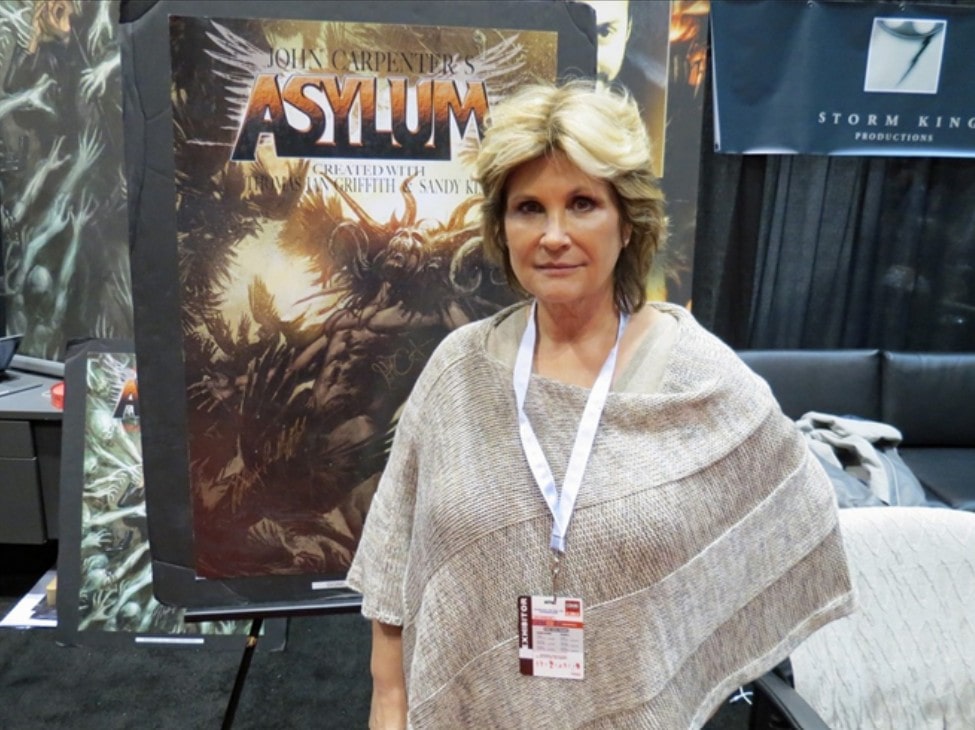 When I met Sandy in 2016
When I met Sandy in 2016
Picture this: you’re the only one not frozen in a world where time has stopped. You could lounge in a luxury Manhattan penthouse while its owner stands motionless nearby. You could feast on gourmet meals, perfectly hot and untouched, at high-end restaurants.
But what if you could bring others back to life with just a touch? Would you break the silence for companionship — or keep this frozen paradise all to yourself? The possibilities seem endless, but in a world like this, making the wrong move could unpause more than you bargained for…
Check out the trailer set to “Beyond the Gallows” from Carpenter’s latest album, Lost Themes IV: Noir.
Pause is written by Matthew K. Manning (Batman/Teenage Mutant Ninja Turtles Adventures), illustrated by Conor Boyle (Judge Dredd), and lettered by Janice Chiang.
Issue #1 of the six-issue limited series is available today, with new issues arriving monthly through August.
Comment on Worldbuilding Articles: 2025 Reader Poll Results by Rebecca Newsome
In reply to Cindy Houghton.
I really like the body piercing aspect but would go one step further with direct implants into the skin. Wonder if that would work? Maybe allow you to keep a certain powerful sigl close to an area of the body that it needs to sit in to work correctly. Has anyone brought this up already and I’ve missed it?
Review of Mother of Rome by Lauren J. A. Bear
As a Bookshop affiliate, I earn from qualifying purchases. Book Description: A powerful and fierce reimagining of the earliest Roman legend: the twins, Romulus and Remus, mythical founders of history’s greatest empire, and the woman whose sacrifice made it all possible. The names Romulus and Remus may be immortalized in map and stone and chronicle, but their mother exists only as a preface to her sons’ journey, the princess turned oath-breaking priestess, condemned to death alongside her children. But she […]
The post Review of Mother of Rome by Lauren J. A. Bear first appeared on Fantasy Cafe.Spotlight on “Twist” by Colum McCann
Twist by Colum McCann is a propulsive novel of rupture and repair in the digital…
The post Spotlight on “Twist” by Colum McCann appeared first on LitStack.
On McPig's Wishlist - The Serpent Called Mercy
 The Serpent Called Mercyby Roanne Lau
The Serpent Called Mercyby Roanne LauThe Witcher meets Squid Game in this Malaysian Chinese-inspired epic fantasy novel where a debt-ridden slumdog joins an illegal monster-fighting arena for some fast coin, but quickly learns the most dangerous beasts are outside the ring, by debut author Roanne Lau
Lythlet and her only friend Desil are shackled to a life of debt and poverty that she fears they will never escape. Desperate for money, they sign up as arena combatants who fight sun-cursed beasts in the seedy underworld of the city.
Match-master Dothilos is initially enamored of Desil’s brawling reputation, but after seeing Lythlet lead the pair to triumph with her quick cunning, he takes her under his wing, scorning Desil. Ambition takes root in Lythlet’s heart as a life of fame and wealth unfolds in her imagination.
But Lythlet isn’t the only one out for coin and glory, and she soon finds herself playing an entirely different game—a game of politics and deception. As the cost of her ambition grows, she will have to decide if sacrificing her honor, and only friendship, is worth the chance to shape her own fortune.
A whirlwind of blood-pounding battles as characters grapple with their choices in the face of wealth and financial security, The Serpent Called Mercy's heart is the underlying, steadfast friendship between its protagonists.
Expected publication: March 25, 2025
Book Review: The Ragpicker King by Cassandra Clare
I received a review copy from the publisher. This does not affect the contents of my review and all opinions are my own.
 The Ragpicker King by Cassandra Clare
The Ragpicker King by Cassandra Clare
Mogsy’s Rating: 3.5 of 5 stars
Genre: Fantasy
Series: Book 2 of The Chronicles of Castellane
Publisher: Del Rey (March 4, 2025)
Length: 576 pages
Author Information: Website
The Ragpicker King is the second book in The Chronicles of Castellane series by Cassandra Clare, returning to the intricate world established in Sword Catcher. The usual caveats apply—if you have not caught up yet, this review may contain spoilers or book one!
The story opens in the aftermath of the devastating palace massacre that shook the city of Castellane. Those involved are desperate for answers—how could this have happened, and why? Kel Saren, who has filled the role of loyal Sword Catcher since he was a young boy, serves not only as Prince Conor Aurelian’s body double and protector but now must also play an investigator, tasked with uncovering the perpetrators behind the attack. To do so, he must venture beyond the glittering court and into the city’s dark underbelly, where the powerful fixer and information broker known as the Ragpicker King reigns. As Kel’s investigation pulls him deeper into danger, he begins to realize that his ability to shield the prince has limits, especially as the crown’s enemies grow bolder. While cleaning up Conor’s messes has always been part of Kel’s duty, which he performs gladly since the two men are as close as brothers, this time the consequences may be far graver than either of them anticipate.
Meanwhile, Prince Conor himself struggles to cope with the trauma of the massacre and witnessing the death of the innocent girl to whom he had been betrothed. As rival factions in his court continue to scheme for power and influence, he has no choice but to brace for yet another arranged marriage designed to secure his kingdom’s stability—even as his heart already belongs to someone else. And across the city, Lin Caster, an Ashkar healer and granddaughter to the king’s most trusted advisor, finds herself caught in a terrible predicament of her own making. In a desperate attempt to save her sick friend, she had openly proclaimed herself the reborn Ashkar goddess. Now, a visitor has arrived in town to test her claim, ready to subject her a series of trials where failure could mean disastrous consequences.
The Ragpicker King does everything a sequel is supposed to do. Clare expands on the world-building that made Sword Catcher so compelling, further exploring Castellane’s political landscape and the murky conspiracies simmering beneath its surface. In addition, she continues to bolster the storytelling by adding more to both court intrigue and personal dramas. Profound changes take place as characters mature in the face of new struggles, especially in Conor’s case. Once carefree and impulsive, the prince is finally beginning to take Kel’s advice to heart—learning that it’s time to grow up and be a true leader. However, taking responsibility also comes with a downside as his new aspirations come in conflict with the status quo at court, causing heightened political tensions. Subsequently, Kel’s natural instinct to shield his friend from further confrontation actually ends up doing more harm than good. He remains my favorite protagonist, dealing with his identity and place in the world as “Sword Catcher.” Lin, on the other hand, sees her star fade a little in this second novel as her storyline takes her farther away from the main plot at cause, causing her chapters to feel somewhat apart and disconnected.
Despite all these developments, pacing is also a mixed bag. The novel feels much longer than it is, due to the burden of lengthy explanations and setup. The narrative frequently goes on tangents, trying to shoehorn in and lingering on the characters’ various romantic entanglements. Don’t get me wrong, I don’t mind a little romance, but definitely not at the expense of the more significant stakes unfolding in the world at large. A touch of spice can add interest and depth, but with so much else at play, who gets paired up with whom is the least of my concern and feels like a distraction. In particular, the middle section dragged on with its meandering, soap opera-style drama, while the main story arc was crying out for more attention and momentum.
Happily, things pick up in the later parts of the book, where we see much stronger cohesion. As the plot reaches the climax, it unleashes a bombshell and an emotional payoff that’s worthy of the buildup. While it leaves some threads unresolved, including major changes for all our protagonists, the ending leaves plenty of motivation to pick up the next installment.
Ultimately, The Ragpicker King is a sequel that—while ambitious and expansive—is far from perfect. It does plenty of things well, including building upon the scope of its world, but admittedly it also stumbles in other areas, like pacing and character balance. On the whole, it also has the unmistakable feel of a bridge book. That said, I am interested in seeing how the next installment will handle the questions and conflicts that have been left enticingly open. The book’s ending sets the stage for what promises to be explosively fun times in the journey ahead.
![]()
![]()
More on The BiblioSanctum:
Review of Sword Catcher (Book 1)
Business Musings: Doing The Work Amid The Noise
Please note: This originally went live on my Patreon page on Sunday night, February 9, 2025. If you want to see most of my business posts these days, you’ll find them on Patreon. I’m only going to post a handful here.
Doing The Work Amid The NoiseThere are times in life when being a writer is hard. I don’t mean real-world hard. Real-world hard is when your job is so important that one small error means someone else dies. There are a lot of real-world hard jobs in the world, and they keep the rest of us safe and alive.
As I said in a post a few weeks back, entertainment is important as well. We have an obligation to help those who are doing real-world hard jobs by giving them some kind of respite at the end of their long days.
But that means we have to do the work, and the work comes out of our brains. When we’re panicked and distracted—checking the news every fifteen minutes, looking at our social media, worrying aloud with our friends about what is going to happen next—it’s difficult, if not near impossible to concentrate on our made-up worlds.
They feel so small and unimportant.
We don’t see readers enjoying our work. We have no idea that a reader will close a book and hug it, like I did a week ago when I finished Robert Crais’s latest, The Big Empty. I know that Bob is a slow writer, and I wish he wasn’t, because I would love another of his books right now.
He lives in L.A. Not only are people there dealing with the chaos that is America right now, they’re dealing with the devastating losses of many parts of their community. I suspect he’s distracted.
I know that Connie Willis is because I’m following her Facebook page in which she aggregates all the news of the day. I have no idea how she finds the time to write fiction or if she even is. I hope she is.
I’m a former journalist. I love information, the more the better. But, after the election, I shut off all media. I canceled all of my major newspaper subscriptions, stopped watching everything but the weather on any news channel, and got a lot done. I needed to because of an ongoing business crisis.
But I also needed the rest.
And I knew if I didn’t figure out how to control the information that came to me, I would not write another sentence—at least in fiction.
Writing fiction, as unglamorous as it sounds, is my job. It’s what I do for a living. But it’s also what I would do if the world ended tomorrow (which has gotten closer, according to the Doomsday Clock run by The Bulletin of the Atomic Scientists).
I make up stories. I always have. I write them down and have done that since I was in grade school.
Storytelling keeps me sane.
After the despair of the election (not shock, because I kept saying all summer [hell, all year] that this was possible, even if I wasn’t really listening to myself), I needed that quiet. I needed to accept that the world as I had known it for years would change dramatically.
How dramatically? I had—and have—no idea. This post is not about what’s going on out there in the real world. It’s changing too fast. I sat down at 1 p.m. on a Sunday, knowing that by the time I finish, more news will pour in.
It might be good; it might be bad; it might be hopeful; it might be devastating. It might be all those things at once.
It’s too much for the brain to cope with—and right now, it’s designed that way. Which is why I urge you to take care of yourself and your family first. Then take care of your community, whatever that might be, and then pick one or two or three issues to work on and be part of the solution for. If all of us do that, our differences will make sure that we will cover the entire spectrum of problems that are popping up like weeds.
Yes, I know. People are dying. I know. The situation is growing more dire by the day.
One step at a time. That’s all we can do. See above.
The problem is, then, how to corral the brain and give it enough space so that you can write.
That solution is different for each and every one of us. And it’s different each one of us as an individual at different points in our lives.
I can only give you examples from my own life.
Example #1: I got very sick when I was living on the Oregon Coast. I’m already allergic to half the world; there, we later discovered, I was living in mold and was allergic to that too. We moved to the dry desert here in Nevada just in time. I doubt I would have made it through the year otherwise.
But, I was and am a writer. I wrote through all of that, and even wrote a book about my methods for writing when I barely had enough strength to get out of bed. The book is called Writing With Chronic Illness.
Some of the solutions in that book might work for some of you now. Doing the writing first, being happy with what you can accomplish, accepting your limits—all of those are important.
I did them as best I could there. Here, in Las Vegas, I’m healthier, although the chronic conditions do fell me more than I would like. I can get through them easier in this dry climate, so sometimes I forget what I had learned.
Example #2: Our close friend Bill Trojan died, and Dean had to handle Bill’s horribly messy estate. At the same time, my editor at one of the traditional publishing houses had a mental meltdown and spent a half an hour on the phone, screaming at me and telling me I was the worst writer on the planet.
No one treats me like that. No one. So I immediately divorced that publisher, offering to pay back the money they had invested in me and my work so that I could get the rights to my books back.
That was at least $250,000 that I would pay—even though we were embroiled in the estate mess and Dean was not working on publishing and writing, due to that big problem.
My confidence was shaken, and we were in financial difficulties. I had to figure out how to write a funny novel that was still under contract.
I did, a page here and a page there. I remember sitting in my office and writing long paragraphs about how awful that editor was to get her out of my head so that I could actually finish a book that was under contract for someone else.
I did it, but shutting out the noise was almost impossible. It took concentration. It took will power. It took a daily reminder to myself that writing is supposed to be fun.
And you know what? Many days, it ended up being that way, just because of the determination.
Example #3: As many of you know, the last two or so years of my life have been filled with turmoil. Dean lost much of his eyesight, which meant we had to make some massive changes in our lives. Then, just as he was getting used to the changes, he fell on a 5K race and destroyed his right shoulder.
He couldn’t do much work. He was healing. I cared for him and, as I dug deeper into the business at our publishing company, I realized it was sick too.
We had to make drastic changes there, and I had to take over the company completely.
Which meant it got run the Kris way—lots of questions, lots of systems, lots of data, lots of procedures. The old staff buckled under the Kris method (which had not been in place since I got very ill in 2015), and within 2 months, they were gone…leaving problems so massive behind that those problems either had to be solved or the company had to be dissolved.
Dean and I chose solving those problems, and we had (and have) great help in doing so. These sorts of events teach you who your friends really are.
I knew, as we dug in, that I was not going to be focused on the writing. I needed to figure out how to harness that focus in a different way.
I had a novel to finish as well as short story deadlines from traditional short fiction editors. I was not going to miss those deadlines, and I needed to finish that novel.
The problem was that in this small condo, I did not have a second business office. I had to do the work on my laptop and my writing computer in my writing office.
I knew I needed help.
So I set up a challenge with other writers. I made it costly for me to lose (not just pride—which, pardon my French, fuck if I care about personal pride). I started the first challenge in December of 2023, and continued the challenges through most of 2024.
I lost a couple of times. But the challenge was the only thing that got me to the computer. Daily word count…that I had to report (and God, I hate reporting). I couldn’t fudge it for my own sake, and I didn’t.
I finished that novel, and a lot of short fiction, before September hit, and the business stuff combined with some legal matters that were all do-not-miss and I had to miss some writing days.
It irked me—and kept the writing as a focus.
Usually I don’t bring others into my writing process, but I knew I would need it in 2024. So I did it.
I still have a writing challenge going, this one for short stories, because I know that now, I need to get back to massive novel production, and I didn’t want to lose my short story focus. I have to do both (which I have done throughout my career).
It’s not as draconian as the 2024 challenge, but my life is different now. The business has settled into a pattern. We’ve moved the main offices to Nevada, which means I have a business desk. (Yay!) And we’ve gotten through some of the mess left by the old staff, and what’s left we’re slowly wrapping our arms around.
One thing I noticed, though, in all of those crises, is that the world swirled around me, with its problems and its demands. In each of them, it felt like a massive storm pounding on the outside of my house—you know the kind: the rain is horizontal, the winds are devastating, and the view outside the windows is black and gray, with almost no visibility at all.
You just have to wait out those storms and know that when they’re over, everything will be different, but some things will still stand. There will be rebuilding. There will be heartbreak. But the sun will have come out to reveal what’s left.
In the middle of it, though, you just have to survive it and keep the important things safe.
Your writing is one of those important things. It will take effort to keep it safe. Effort on your part.
And you’ll have to figure out what it will take for you to do it. My methods might not work for you. Find what works. Realize that those things might not work in a different kind of crisis.
But you can find a way to be with yourself during these tough times.
Here are a few practical things you can do in most (not all) crises:
- Protect your safe space. For me, that’s my writing space. I couldn’t do it during this last crisis, but I managed somehow. It felt uncomfortable and reminded me yet again about the importance of having a dedicated writing computer.
- Shut off the internet. Dean uses a different computer for his internet research—one that’s just a foot or two away from his writing computer. I shut off my wi-fi, so that clicking over to the internet for research takes a conscious action, and often makes me realize that I was just heading over to distract myself. (Different strokes, y’know.)
- Set a daily writing time. Make sure your family knows what it is, and that you shouldn’t be disturbed. Try to pick a time when it’s not easy to disturb you (early mornings; late evenings)
There are so many other practical things you can do, but again, they become specific to you.
One other thing—a tough thing—is that sometimes the project you were working on when the crisis hit is not the project your creative voice needs right now. You might have to switch—something shorter, something longer, something that requires less research, something that requires a different kind of concentration.
It’s up to you.
But the key here is to remember that when you write, you’re inside and safe from the storm. It will rage around you unabated while you’re working. It’ll probably (sadly) still be there when you’re done with today’s writing session.
But you got that session done. It’s a victory.
Celebrate the tiny victories. Keep writing.
And remember, in almost every difficult time, the only way out is through.
“Doing The Work Amid The Noise ,” copyright © 2025 by Kristine Kathryn Rusch.
Promo video for the new Polish translation of Stinger
Here’s a promo video for Vesper’s Polish translation of Stinger that was posted by mroczne_strony!
https://www.robertmccammon.com/wordpress/wp-content/uploads/2025/02/mroczne_strony_602a2ada705b4af4bbbc4044882c789e.mp4Busy, busy

House Andrews are deep in the editing cave for Maggie. How deep? They shared an update yesterday on Facebook:
A lot of work, but of course what we take from it is a very chalant OMG OMG OVER EIGHT HUNDRED PAGEEEEES! WE SHALL DEVOUR!
No? Just me? Hehe.
But that takes a lot of effort. I am their herald today, conveying their apologies that they will not have time for a Wednesday post.
Instead, I’d like to ask you something I’ve been curious about: what do you do in your every day life to add a bit of whimsy to it?
This was a post a while ago on TikTok and I’ve had the most lighthearted few moments reading the comments. For example, someone shared that they meow songs to their cats “so they can hear the lyrics in their own language“. Others that they “put on pyjama sets the night of fresh sheets, so they can have ‘fancy sleep’” or “when it’s time to wash the dishes, I tell them it’s bath time“.
I realised I’ve been doing this since I was a child: whenever there’s a storm out, I fling out my hands (dramatically, of course) and call out “WINDS!” and when the wind intensifies, I feel like a powerful witch. Nowadays, I also look expectantly at Mr Mod R until he acts impressed with my magical powers.
So, what are the small things you do that are perhaps silly, but bring you a bit of joy in a world where it’s increasingly hard to find some?
The post Busy, busy first appeared on ILONA ANDREWS.
New Edge Sword & Sorcery Magazine – New Jirel of Joiry!
In 2023, New Edge Sword and Sorcery Magazine (NESS) emerged, and it continues to deliver outstanding magazines, renewing past classics while showcasing contemporary and veteran authors. Notably, issues 1 and 4 include Elric tales by Michael Moorcock. Black Gate featured the crowdfunding and reviewed the initial volumes, and published an interview with editor Oliver Brackenbury (links).
A new crowdfunding campaign to bring issues 5-7 to life is live on Backerkit through March 15th. NESS continues to bring us Jirel of Joiry stories! We’ll highlight Jirel of Joiry here but the magazine offers much more.
Read this to learn the trajectory of Jirel of Joiry and NESS! Jirel is alive and well!
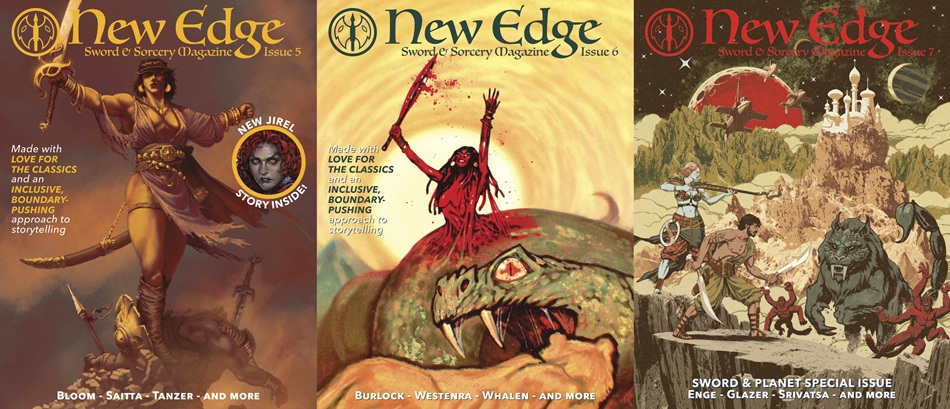 Press Release – NEW EDGE SWORD & SORCERY Backerkit crowdfunding for Issues 5-7:
Press Release – NEW EDGE SWORD & SORCERY Backerkit crowdfunding for Issues 5-7:
Building on their success in 2024, a Backerkit campaign has been launched for new issues.
TORONTO, Ontario, February 13th — Begun in Fall 2022 with issue #0, short story & non-fiction magazine New Edge Sword & Sorcery is running a crowdfunding campaign on Backerkit to produce issues #5, 6, and 7 in accessible digital, classic softcover, and luxurious hardcover (w/endpage art and a bookmark ribbon!) formats. These will be released in November of 2025.
Backing this campaign is a way to be a part of genre history: JIREL OF JOIRY will be returning with her second new story since the originals in Weird Tales! Jirel was the first Sword & Sorcery heroine, created by legendary Weird Tales regular, C.L. Moore. Like Alice in Wonderland with a big f***ing sword, Jirel had compelling adventures in bizarre dream-logic realms, balancing a rich emotional life with terrifying struggles against dark forces! Predating Red Sonja, she & Moore were a direct influence on Robert E. Howard’s writing, as well as so many who came after.
Alas, Moore only wrote a handful of Jirel tales — which are still collected, published, and read to this day. So it’s a good thing that when backers of the campaign helped it hit 100% funding in just four days, they helped make sure a new story will be published! Authorized by the estate of C.L. Moore, “Jirel Meets Death” has been written by the magnificent MOLLY TANZER (editor of Swords v. Cthulhu, author of Creatures of Charm and Hunger, and so much more).
Expanding to three issues a year also allows for the first ever special issue! NESS #7 is dedicated to S&S’ older, science-fantasy cousin Sword & Planet – featuring new S&P tales and non-fiction. Twenty-six other authors are spread across the three new issues this campaign is funding, including names like Alec “Black Beth” Worley, Premee Mohamed, and Dariel R.A. Quiogue.E
very story and non-fiction piece in the issues will be paired with two original B&W illustrations as soon as the crowdfund meets its first stretch goal – Double Art. The goal after that is a fund to cover shipping discounts for backers outside the United States, and from there every stretch goal is a pay raise for contributors. These goals make clear the magazine’s values of paying creators as much as they can, and making NESS financially accessible.
The magazine’s editor, Oliver Brackenbury, promises the magazine is “Made with love for the classics and an inclusive, boundary-pushing approach to storytelling”, delivering high quality writing and art in a wide variety of styles. Sword & Sorcery can be many things and still be Sword & Sorcery…or Sword & Planet!
Readers should race to back the magazine’s new issues before the campaign ends on March 15th, so they can benefit from crowdfund exclusives like bonus stories, discounted back issues, and cover art postcards. They can even win free, unique softcover issues annotated with behind-the-scenes info by chatting about S&S in the crowdfund’s community tab!
With the NESS pastiche continuing the heroine’s saga, here are the Jirel stories- “Black God’s Kiss” (C.L. Moore October 1934)
- “Black God’s Shadow” (C.L. Moore December 1934)
- “Jirel Meets Magic” (C.L. Moore July 1935)
- “The Dark Land” (C.L. Moore January 1936)
- “Quest of the Starstone” (C.L. Moore with Henry Kuttner November 1937)
- “Hellsgarde” (C.L. Moore April 1939)
- “Jirel and the Mirror of Truth” (Molly Tanzer 2024)
- “Jirel Meets Death” (Molly Tanzer 2025)
Ryan Harvey authored two Black Gate posts in 2007, one covering the author’s life and contributions in detail (Jirel ofJoiry: The Mother of Us All) and another reviewing Black God’s Kiss, Planet Stories‘s collection of all of C.L. Moore’s Jirel stories (including a collaboration with husband Henry Kuttner).
The red-haired, yellow-eyed, and lioness-fierce sword-wielding Jirel has an unassailable place in contemporary popular culture, along with her genre cousins, the laser-gun wielding heroine and the wooden-stake-armed heroine. Fantasy, science fiction, and horror no longer have “Males Only” signs over their doors, either for their warriors or writers. So many female authors and protagonists thrive in speculative fiction today that it seems hard to imagine a time when the opposite was the case. It feels impossible to visualize fantasy before Catherine Lucille Moore broke down the gender barriers (even if she did partially disguise her sex behind her first initials, C. L.) and brought with her Jirel. Beautiful, fierce, loyal, defiant, passionate Jirel did more than raise her sword against sorcery. She slashed through the confining walls around speculative fiction and let it reach toward the horizons in a way it never could have before her advent. That achievement alone assures Jirel and her creator a place in the firmament of the stars of fantasy literature.
— Ryan Harvey, Jirel ofJoiry: The Mother of Us All
 Saprophial interior art, NESS #3, Jirel
Author, Artist, and RPG!
Saprophial interior art, NESS #3, Jirel
Author, Artist, and RPG!
If you’re interested in learning more about Molly Tanzer and her approach to writing Jirel, check out the article Old Sorcery, New Edge: Q&A with Molly Tanzer (by Alec Worley, Feb 2024) and the Return of Jirel Interview hosted by Oliver Brackenbury, editor of NESS (2024).
NESS Magazine is always saturated with interior art. Artist Saprophial illustrated four pieces “Jirel and the Mirror of Truth”. The artist was a perfect choice since she also created the art for the 2022 Black God’s Kiss RPG Aventure and Game (check out Blazing Worlds website for more info.)
Back New Edge S&S Issues 5-7 Now! (link)
S.E. Lindberg is a Managing Editor at Black Gate, regularly reviewing books and interviewing authors on the topic of “Beauty & Art in Weird-Fantasy Fiction.” He is also the lead moderator of the Goodreads Sword & Sorcery Group and an intern for Tales from the Magician’s Skull magazine. As for crafting stories, he has contributed eight entries across Perseid Press’s Heroes in Hell and Heroika series, and has an entry in Weirdbook Annual #3: Zombies. He independently publishes novels under the banner Dyscrasia Fiction; short stories of Dyscrasia Fiction have appeared in Whetstone, Swords & Sorcery online magazine, Rogues In the House Podcast’s A Book of Blades Vol I and Vol II, DMR’s Terra Incognita, and the 9th issue of Tales From the Magician’s Skull.
7 Author Shoutouts | Authors We Love To Recommend
Here are 7 Author Shoutouts for this week. Find your favorite author or discover an…
The post 7 Author Shoutouts | Authors We Love To Recommend appeared first on LitStack.
SPFBO Finalist Review: The Forest at The Heart of Her Mage by Hiyodori

ABOUT THE AUTHOR: Hiyodori is not a bird. But she is dearly fond of her namesake, a plain-looking brown-gray bird that likes to perch near her Tokyo apartment and unleash the most incredible primal screams. Hiyodori (the human author) loves stories with fantastical settings and complicated, difficult-to-define relationships. All of her books—including Carrion Saints, her latest standalone novel—take place in the same shared fantasy universe.
The Forest at The Heart of Her Mage links: Amazon, Goodreads
ESMAY
One part dark fantasy quest, one part unconventional f/f romance, one part grief/trauma healing journey, The Forest at the Heart of Her Mage is an exceptionally imaginative and reflective quest adventure that takes the concept of slow-burn storytelling to the next level.
For me, The Forest at the Heart of her Mage started off extremely strong, and it immediately hooked me with its intriguing plot, world and romance set-up. I mean, when you promise me a sapphic opposites-attract marriage of convenience, a quest into a dangerous dark magical forest, and lots and lots of emotional turmoil and trauma… I am IN. And for the most part, Hiyodori totally delivers on all this great potential, albeit not in the way that I was totally expecting or hoping for.
See, on the one hand I found Hiyodori’s wild imagination and refreshingly unconventional storytelling to be extremely impressive and enjoyable. The steampunkish scifantasy world building was so cool to me (even if some aspects felt a bit shallow at times), especially in combination/contrast with the more traditional and almost dark fairytale-esque qualities of the world and story. Particularly the whole concept of mages needing maintenance on their magic cores to prevent them from going berserk stood out to me, not least because I very much like the idea that an operator could maybe swoop in to untangle my mess and fix my physical and mental state up a bit; wouldn’t that be the dream?
Yet on the other hand, I had a really hard time connecting to these characters, and I soon found myself struggling to stay engaged in their quest. There was a certain ‘je ne sais quoi’ missing from Tiller’s narration of this tale for me, and her tendency to lapse into (rather repetitive) introspective reflections of her traumatic past unfortunately hindered the pacing quite a bit for me. And although these characters are quite emotionally complex, I personally felt like they didn’t have personality outside of their trauma and some exaggerated quirks, which made it hard for me to get invested in them.
Moreover, I think marketing this book as a slow-burn sapphic fantasy romance adventure maybe does it a bit of a disservice, since I personally think it shines much more as a nuanced exploration of grief, identity, family, and childhood/generational trauma. Yes, the complicated yet inexplicably fun dynamic between Tiller and Carnelian lies at the heart of this story; and yes, I am always here for romances that rely more on emotional connection rather than physical/sexual attraction. However, I personally didn’t feel any kind of chemistry between them until maybe the last 5% of the book (and even then it was mostly based on guilt and trauma bonding?), and I think that their dynamic shines more as friends than as lovers.
For me, the time spent in the deliciously dark Devouring Forest was easily the strongest part of the novel, closely followed by the long and beautifully satisfying sequence of falling action at the end. So while The Forest at the Heart was maybe a bit of a drawn-out and bumpy ride for me personally, I think Hiyodori ended this unique adventure on a really high note, and it’s more than worth giving a shot if you go in with the right expectations.
ŁUKASZ
Magical forests are nothing new in fantasy, but the one in The Forest at the Heart of Her Mage isn’t a typical enchanted glen with sparkling streams and the occasional talking tree. No, this forest is alive, hostile, and more than a little creepy. Tiller, our protagonist, is voluntarily walking right back into it after two decades of carefully avoiding the place. Brave? Sure. Questionable life choices? Absolutely.
But she’s not going alone. Carnelian, a mage with a bad reputation and a knack for making things complicated, accompanies her. Together, they deal with monsters, mysteries, and politics. There’s also a slow-burn romance with more tension than action.
Let’s start with the good stuff: this is a beautifully layered book. The magical system, split between regimented human magic and the wild, unknowable magic of the forest, is well-thought-out and intriguing. The forest itself feels like a character - alive, unpredictable, and unsettling. And then, the budding relationship between Tiller and Carnelian is as much about peeling back emotional layers as it is about fending off literal monsters, and their dynamic is a highlight. If you like your romance slow-burn with a healthy dose of secrets and snark, this delivers.
But - and there’s always a but - the pacing could be tighter. The story leans into introspection and atmosphere, which is great when it’s working, but occasionally makes the story feel like it’s wading through mud. Tiller and Carnelian spend a lot of time trekking through the wilderness and working through their issues, which is interesting in parts but sluggish in others. The action scenes, while sharp, are scarce, and the overall pace is steady.
Still, the payoff is, I think, worth the time. If you’re in the mood for a book that’s eerie, emotional, and a little meandering, The Forest at the Heart of Her Mage is precisely this.
OFFICIAL SPFBO SCORE

The Spellshop - Book Review
 The Spellshopby Sarah Beth Durst
The Spellshopby Sarah Beth DurstWhat is it about:The Spellshop is Sarah Beth Durst’s romantasy debut–a lush cottagecore tale full of stolen spellbooks, unexpected friendships, sweet jams, and even sweeter love.
Kiela has always had trouble dealing with people. Thankfully, as a librarian at the Great Library of Alyssium, she and her assistant, Caz—a magically sentient spider plant—have spent the last decade sequestered among the empire’s most precious spellbooks, preserving their magic for the city’s elite.
When a revolution begins and the library goes up in flames, she and Caz flee with all the spellbooks they can carry and head to a remote island Kiela never thought she’d see again: her childhood home. Taking refuge there, Kiela discovers, much to her dismay, a nosy—and very handsome—neighbor who can’t take a hint and keeps showing up day after day to make sure she’s fed and to help fix up her new home.
In need of income, Kiela identifies something that even the bakery in town doesn’t have: jam. With the help of an old recipe book her parents left her and a bit of illegal magic, her cottage garden is soon covered in ripe berries.
But magic can do more than make life a little sweeter, so Kiela risks the consequences of using unsanctioned spells and opens the island’s first-ever and much needed secret spellshop.
What did I think of it:When Jeffe told me I should read this book, I was easily convinced as I absolutely love Sarah Beth Durst's The Queen of Blood (I'm so going to get my trotters on the new paperback once it releases, because: have you seen that new cover!).
And this book is so going on my keeper shelves and will be hugged, treasured, and reread!
What a beautiful, touching read. If you need a cozy Fantasy read: look no further and get your hands on The Spellshop!
I loved Kiela from the start, and don't get me started on Caz, because I'll be singing his praises for hours. I mean: an intelligent, talking, sarcastic spider plant!!
The story is so sweet, and I kept reading to see what happens next for Kiela and Caz. There's some danger to keep you on edge, but mainly this book was delightful and full of whimsy. It made me smile while reading.
So you bet I jumped on the chance to read an Advance Reader Copy of the next book set in the same world as The Spellshop.
Why should you read it:It's a beautiful, cozy, and heartwarming Fantasy read.

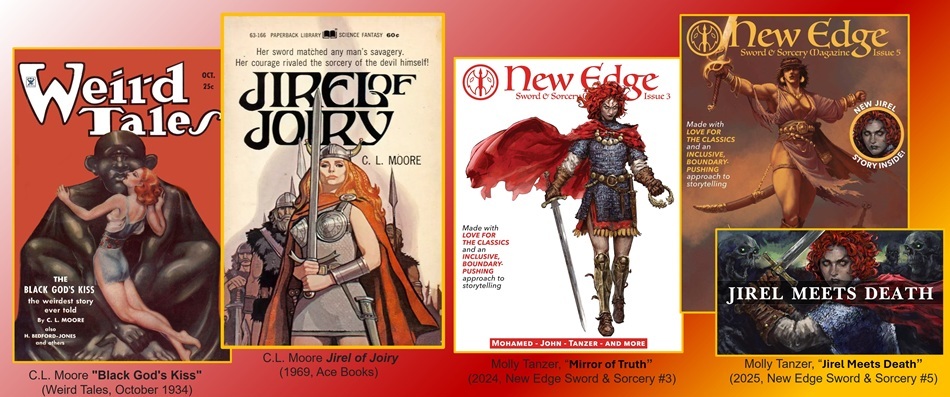
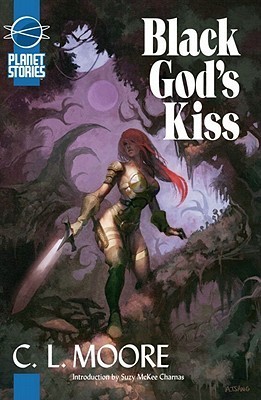


Recent comments